Conflict between Human Law and Law of God in Sophocles' Antigone
Sophocles' Antigone focuses on the conflict between human law and the law of the gods when following both sets of laws at a time seems to be impossible. Antigone wishes to honor the gods by burying her brother, but the law of Creon decrees that he shall have no burial since her brother is technically a traitor to the state.

Sophocles
Antigone, the eldest daughter of king Oedipus and Creon, now the king of Thebes, both proud and willful people, are in constant conflict throughout the play. In other words, there is the conflict between religious Antigone and tyrant Creon. Creon, a tyrant considers the state as his private property as a king, but Antigone's great courage to challenge the authority makes the audience feel intense sympathy and admiration for her. She is a martyr to her beliefs.
The main conflict in Antigone centers on a distinction between law and justice. Creon, the maternal uncle of Antione and Ismene, has made a decree: Polynices, the brother of Antigone and Ismene was guilty not only of killing his brother, Eteocles, but also of attacking the state and like all traitors Polynices will be denied a proper burial. When the action of the play begins, Antigone has determined to give her brother, Polynices, the burial that ancient tradition and her religious beliefs demand as her responsibility of being his sister. Antigone says that she must act as per the religious law, the law of higher God. Ismene declares simply that she cannot go against the law of the citizens (human law). Antigone, knowing full well the consequences of defying Creon, acts on her principles as she realizes that law of God demands the burial of a dead body, she acts on her principles. According to her, human beings, themselves, are imperfect, so the laws made by the king are also imperfect; only the laws made by God are perfect. So, she is motivated by the fact that she has to bury the corpse of her brother at any cost, even at the cost of her death.
Politically Creon might be correct as it is the strategy of the human law to defy the traitor from being buried, at the same time Antigone is also right because it is her religious duty to bury the dead brother. Antigone has a moral and ethical power as an individual, though Creon has political power as king. As Creon’s Tyranny (dictatorship) increases, Antigone’s stubbornness also increases. When Haeman, Antigone's lover and Creon’s son, realizes that religious laws are for human beings, he takes the side of Antigone. But Ismene is one the side of political power, so she tries to persuade Antigone to surrender the king. But Antigone remains constant despite other' efforts of persuasion.
Although Antigone has been imprisoned and she killed herself, Creon doesn’t seem to be victorious. Morally and ethically he has been defeated by Antigone, though she has been defeated politically by Creon. He is in irreparable loss as he has gone against the wish of God. We can't discard religion as religion provides stability in human life. The hubris in Creon is that he has a single willed determination; he refuses others advice though they might be useful for him.
Thus, we can see the balance between faith (Antigone) and Skepticism (Creon’s blasphemy). The complex conflict between Antigone and Creon occurs on the level of citizen and ruler and on a personal level in the relationship between Haemon, Creon’s son, and his intended bride, Antigone. The antagonism between Creon and Haemon begins slowly, as Haemon appears to yield to the will of his father, but culminates in Haemon's ultimate rejection of his father by choosing to join Antigone in death. Moreover, the queen suicides herself by hearing son's death.
When Teiresias, a blind seer, reveals a prophecy of death and punishment and begs Creon, for the sake of the suffering Thebes to cancel his decree and give Polynices a proper burial, Creon does not listen to him. By the time, Creon accepts Teriesias' prophecy, it is too late. He has lost his son and his wife has killed herself. Power not only has corrupted Creon but has taken his loved ones from him.
He emerges as stiff tyrant, guilty of making the same mistake that haunted Oedipus. But Antigone emerges as a heroine who presses forward in the full conviction that she is right. She has to honor her dead brother at any cost. Even if she breaks the law of the state, she must answer for what she regards as a higher law. Antigone argues that the law of the God is superior to the law of the state. We suffer when we do not obey God's laws as does Creon. Before recognition he challenges the divine law for the sake of state or human law. Antigone's obstinacy and insolence rudeness for the right cause is far more admirable than Creon’s opinionated defense of the wrong cause. She prefers to die a glorious and stoic death. Finally Creon is left to face the tragic consequences of his own fatal decisions.
Thus, Sophocles' in Antigone emphasizes the interaction between the will of the gods and will of human beings often putting the truths of men and women against the truth of gods. It suggests a high seriousness and religious mission in Greek tragedies, individual free will against the unjust laws of tyrannical king.
